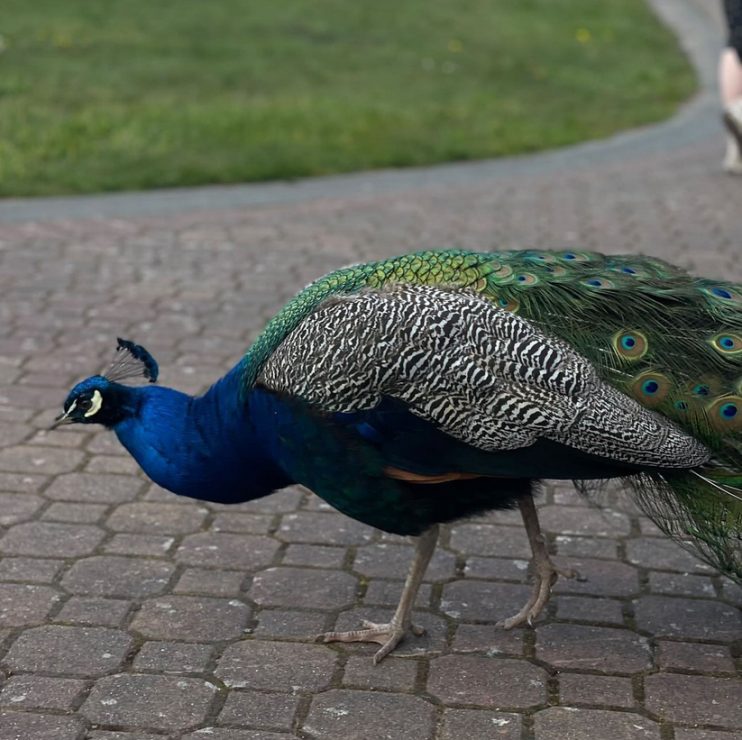A bird specialist weighs in on George the Peacock’s illustrious UVic campus career

Photo via @campuspeacock on Instagram.
A peacock, affectionately nicknamed George, has amassed over 1 000 followers on Instagram and hundreds more admirers during his months of living on the UVic campus, despite concerns about his safety.
Sightings of the bird began at the tail end of the 2022 spring semester. Other peacocks have been spotted on campus in past years, but none have stayed for this long or gained such notoriety.
It was only a week into George’s campus career when a then-first-year biomedical engineering student decided to start an Instagram page in honour of the bird. The student made her first post on April 20, 2022.
“It’s just a fun little thing I do,” the student, who chose to keep her identity anonymous to enjoy the project privately, told the Martlet. She had tested positive for COVID-19 during finals week and wanted something to occupy her time. Taking inspiration from other unofficial UVic Instagram accounts, such as ones that review cafeteria food, she created the account and named the peacock George.
UVic students and campus-goers send their photos of George to the account owner through direct message on Instagram, and she chooses her favourites to post with funny captions.
“I think obviously there are more important things than seeing a peacock, but I do feel like school is stressful, and sometimes (like when you see a cute dog) it makes you happy,” said the account owner.
Despite the account’s success, she is careful to recognize that “a university campus is not the best environment for a peacock to be living [in].”
This student is not alone in her opinion. Dr. Gavin Hanke, curator of Vertebrate Zoology at the Royal BC Museum, agrees that George should not be on campus mingling with students.
According to Hanke, peacocks are not dangerous birds when it comes to their behaviour towards humans. Their effect on other wildlife as an unfamiliar species, however, is a different story.
“My issue with captive birds or exotic birds is disease transmission,” said Hanke in an interview. “There are diseases that can transmit from exotic birds to our birds … and if they don’t have immunity [against] it, it can be devastating.”
Hanke also said that, though a peacock is not a direct danger to students, it is “definitely an attractant for a cougar.” This could pose a threat to other wildlife on campus, but also to student safety, especially since George is known to frequent student residences.
As for how George found his way to UVic, Hanke proposed two possibilities. The most likely story is that the bird escaped and was taken from Beacon Hill Park, where there is a caged peacock population, and dropped on campus or nearby as a joke. He also said it is possible (but unlikely) that the bird walked from Beacon Hill to campus.
According to Hanke, the bird should be removed and re-homed. This way, it can be controlled and kept away from other wildlife that could cause problems, he said.
But it doesn’t appear that George is going anywhere, anytime soon. UVic operations manager, Matt Uganecz has been in contact with Saanich Animal Control and said in an interview that “if it’s not being a pest, [animal control doesn’t] recommend taking any action.”
He also said that George has not caused any incidents, other than leaving unwanted droppings on campus grounds. Uganecz advises students to “think of him as a brightly coloured deer.”
Peter Roberts, UVic grounds supervisor, added that “people should just avoid getting too close, just because it might scare the little guy.”
Both Roberts and Uganecz noted that, should George threaten student safety, they would consider removing and rehoming him, in cooperation with Saanich Animal Control.
“He’s a bit of a character. He’s almost become sort of a mascot,” said Roberts, adding that facilities staff have been feeding George corn and nuts during his time on campus.
As the Instagram page continues to amass followers, George can serve as a cautionary reminder of alien species, said Hanke.
“The unique thing that we call British Columbia is less unique, or less British Columbia, with every species that we release. I would really urge people to not let their pets go or not move animals around as a joke.”







